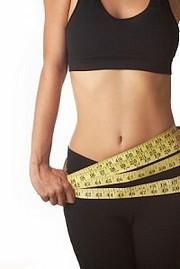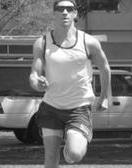 I guess this is something that people worry about, stress over, and also usually do incorrectly. If you asked a bunch of people who struggle with weight, 'how do you measure your weight loss?', the common answer will be - 'I weigh myself on the scales'. Is this the best way? no.
I guess this is something that people worry about, stress over, and also usually do incorrectly. If you asked a bunch of people who struggle with weight, 'how do you measure your weight loss?', the common answer will be - 'I weigh myself on the scales'. Is this the best way? no.What is wrong with the scales? Well, a number of things really. If you are someone that wants to burn fat and tone up (a very common goal), then if you are training correctly, you will be burning fat, but also building muscle. By doing this, your body will be shedding unwanted fat, but you will also be adding a little bit of muscle, and that can equal each other out on the scales, so it may look like all of your hard work in the gym isn't doing anything and people can soon become fed up and disheartened. It doesn't give a measurement on just fat - it simply shows your combined weight of muscle tissue, bones, fat, fluid etc. So, how should you track your progress?
To start with, stop worrying about the scales and becoming obsessed with weighing yourself. I have read some interviews and have had clients that have weighed themselves several times a day, every day! that's just nuts! Your weight can fluctuate throughout the day, depending on what you eat, how much you drink, how hydrated/dehydrated you are and so on. So if you currently do that, stop.
I think one of the best ways to track your progress, is to measure yourself. By taking measurements of your waist, thighs, chest and arms, and remeasuring every few weeks, you will be able to visually see/read your body size reducing. I personally do that, Before I started training again after my injury, I measured my chest, arms, waist and thighs, and have remeasured a couple of times to make sure I am on the right track. I have even gone to the extent of creating an excel document to keep track of my progress, but you don't have to do that. A great thing about this, is that it takes longer to remeasure yourself than it does to quickly hop on the scales, so you are a lot less likely to keep measuring yourself. You don't need to keep checking your weight if you know that you are training hard and eating healthy, because if you are doing that, you just need to be patient. Some people burn fat quicker than others, and some people build muscle quicker than others, we are all different and all do things at a different rate.
I recommend giving body measurements a try, and as mentioned, I personally do it. I don't like to advise people to do something that I don't personally do or have done. You can still use the scales if you want to, as it is quick and handy to make sure you are heading in the right direction. It's probably better for people who are on a muscle building program, rather than a fat loss (because of the reason mentioned above) but if you don't have a good diet, you could be putting on fat, and the scaled will just say you are getting heavier, but it might not be muscle, so it still has its downfalls. I do check my weight on the scales sometimes, and make notes of my weight, just as another tool to make sure I'm progressing and not going backwards. But body measurements are a lot more accurate, as you will be able to tell where you are building more muscle or less. For instance, if a guy wants to 'bulk up', and his arms are improving but not so much his chest, he will then know that he needs to work more on his chest.
'Sunday Supplement' is back in two days, so be sure to check back in!

